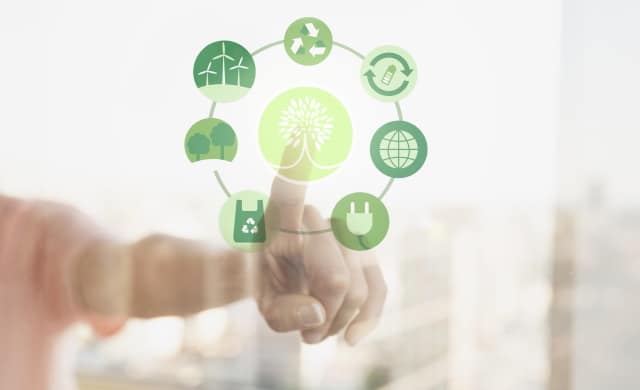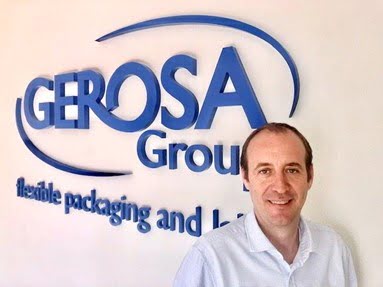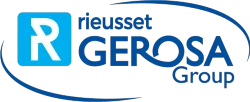
28 Mar SUSTAINABILTY PLAN 2022
Social and environmental commitment is part of Rieusset’s purpose, sustainability being one of its fundamental pillars. Over the years, Rieusset has invested a great deal of effort in achieving work management that is socially responsible with the environment.
On this occasion, Joaquín Vidal, the head of sustainability at Rieusset and the director of technical assistance, quality, environment and R&D, answers the following questions about the company’s sustainability plan:

Where has the initiative to create this sustainability plan come from?
This initiative arises from the Gerosa Group’s high commitment to the integration of sustainability in the corporate strategy, as evidenced in its Sustainability Balance. This identifies the risks and opportunities of our production system, obtaining a clear picture of where we are and where we want to go.
The main objective is to move towards an awareness of sustainability and redirect our actions in order to have the least impact on our environment and not compromise future generations.
What is your role within the sustainability plan? What responsibilities does it entail?
The Group has appointed people in charge of Sustainability in each of its companies. Our objective is that of leading the sustainability project, responding to the different sustainability objectives and establishing new objectives in meetings with the rest of the sustainability leaders of the different Group companies.
We are also responsible for implementing improvements related to environmental sustainability in each of our plants, monitoring the results obtained and sharing experiences and successes among the companies of the Group.
You are responsible for the R&D department. How can innovation help make a product more environmentally friendly?
In the Innovation Department we are immersed in “eco-friendly” projects, which means we are basically looking for new structures made of materials that have a lower environmental impact (recycled materials, bio-materials and/or recyclable materials) and with which –without affecting the product inside– we do not create any unnecessary packaging that may be detrimental for the environment.
Your main clients are from the food sector. Is the creation of sustainable flexible packaging and labels compatible with food protection?
The food sector is subject to specific legal and regulatory requirements due to the demands to guarantee the safety and health of the final consumer. In the design phase, it must be taken into account that the packaging is the medium that allows food to reach the final consumer in optimal conditions in terms of quality and food safety.
Our clients are looking for more sustainable alternatives in packaging design and improvements in materials in order to reduce the final impact of their products, but we cannot forget that there needs to be a balance between food protection and sustainability. This aspect is fundamental in eco-design and we are continuously working in search of innovative solutions, such as thickness reduction, development of monomaterials, compostable materials and products made from recycled materials, among others.
All these options are what we are developing and transmitting to our clients so that we can create safe and sustainable products in search of balance.
On the other hand, it also has to be taken into account that for a product to be sustainable, not only must the product itself be considered, but also that product’s entire life cycle, from the “cradle” of creating the raw material to the “grave”, the end use of the product. That is why many of the actions that can be implemented for the development of sustainable products are approached from various perspectives, such as the optimization of free space in transport to the use of more efficient and sustainable technologies.
Last year, in the interview with Jordi López about sustainability, he explained that on an environmental level, Rieusset focuses on three axes:
- waste recovery
- the life cycle analysis of your products
- the influence you can have on your suppliers so that they may act along this same line of work
How have you evolved over the past year in each one of these axes?
Throughout this year we have been working on the three channels mentioned. Increasingly, waste is disaggregated with the aim of obtaining the greatest possible amount of recoverable waste. Likewise, we are carrying out studies with technological waste treatment centers so as to make waste recoverable that is currently not, through chemical or biological treatments.
We are also immersed in a Life Cycle project of all our products, with the aim of evaluating their impact on the supply chain. Sustainability and social responsibility issues have been included in the evaluation of our suppliers, giving increasingly more importance to these issues in the evaluation and approval of the different suppliers.
And with regard to more specific topics, what changes have you applied in Rieusset that have caused a positive impact on the environment?
Throughout 2021, we applied several changes that have made our impact on the environment more positive. Changes related to energy efficiency, climate change, emission of polluting gases into the atmosphere, waste management, etc.
For example, all the energy consumed during 2021 in Rieusset has been 100% green energy. In addition, our raw material consumption has been much more rational and we are developing products with post-consumer materials. These changes have brought about a decrease in our carbon footprint of more than 30% in the emission of tons of CO2 equivalent.
What are you doing at Rieusset to reduce your carbon footprint?
In order to achieve this objective, a short, medium and long-term action plan was developed which we are rigorously complying to date and we hope to continue working on this milestone.
What objectives of the sustainability plan are intended to be achieved in 2022?
All our objectives are related to the GRI and the SDG. In 2022 we plan to reach the following:
- Rational consumption of raw materials – promoting and implementing initiatives to reduce the consumption of raw materials both in quantity and origin.
- Energy efficiency and climate change – ensuring rational use of energy sources, monitoring and reducing their consumption and greenhouse gas emissions.
- Atmospheric polluting emissions – controlling and reducing the release of polluting emissions (particularly NOx and VOC) into the atmosphere.
- Waste management – reducing the impact associated with the generation and disposal of waste derived from production activities.
- Responsible supply chain management – promoting and guaranteeing responsible behavior within the supply chain both in the selection and qualification phase and in the performance monitoring phase.
- Water resources management – constantly monitoring water consumption to increase extraction efficiency, as well as responsibly managing water discharges from production plants, ensuring that the quality standards required for wastewater are maintained.
All of these objectives are reported in the Group’s annual sustainability balances.
To finish, what would you say to companies that want to start their path towards sustainability in the packaging of their products?
This is the future – we must all follow this path that has already begun in the different government institutions to develop packaging that has the least possible environmental impact, while still fulfilling its main function: product conservation.
| We Manufacture: | Meet Rieusset: |


